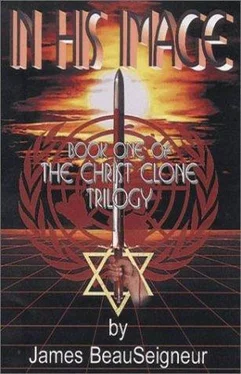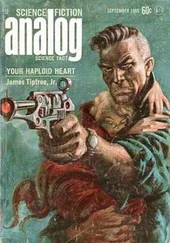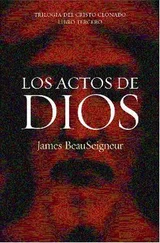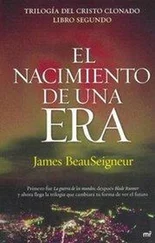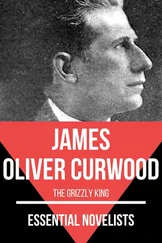"Finally, John, the key to the success of last night's attack was surprise. The Arabs successfully launched a massive three-pronged attack in total secrecy. Israel's Intelligence Agency, the Mossad, has a reputation second to none in the world, but last night they appear to have been asleep on the job. John."
The scene switched to a split screen of the news desk in New York and the reporter at the State Department. "Jim, what about Israel's strategic defense that we've heard so much about? Isn't that a factor?"
"No, John. Although, as you say, Israel is believed to have a highly developed strategic defense – which unofficial estimates say may be more advanced than the US program – this highly touted system is not considered to be a factor in the present conflict. The reason for this is that the Arab attack used entirely conventional forces, while Israel's strategic defense – as its name implies – is designed to defend against a strategic attack by incoming missiles ranging from SCUDS to ICBMs. Against small, low-flying aircraft and ground forces their strategic defense was useless."
"What's the prognosis there at the State Department?" the anchor asked. "Has the possibility of direct U. S. intervention been discussed? And, even if the U.S. does become involved, is there much hope that Israel can recover from this?"
The reporter at the State Department adjusted his earphone before responding. "John, no one is talking openly about direct intervention, although it is very likely that both the U.S. and Britain will respond with assistance in the form of military equipment. To answer the second question: no one is making any bets on the outcome one way or another, but there is some quiet optimism being expressed. Despite the successful first strike, it's important to remember that this is not the first time Israel has suffered a surprise first strike. The first time was in the Yom Kippur war – a war which the Israelis came back to win and win big. The other point of optimism is still Israel's Air Force. Despite the heavy losses, it's possible that the Israelis may be able to make up in quality what they are lacking in quantity. Two examples keep being brought up: the first, as I mentioned, is the Yom Kippur war, in which the Israeli Air Force shot down over two hundred Syrian MIGs without the loss of a single Israeli aircraft. The other example – which in its own way is no less impressive – is that in July of 1970, in their only head-to-head meeting with the Soviet Union, the Israelis shot down six Russian MIG-21s while the Soviets failed to damage even one Israeli aircraft. If the Air Force can duplicate that kind of record in this war, they may still have a chance of surviving."
"Thanks, Jim. Now for more on this story we go to Tom Slade in Jerusalem." The scene switched to the Temple Mount.
"John, Arabs and Israelis have never really needed a reason to fight, but on this occasion the reason is clear. This is a holy war, a 'jihad,' bringing together Arab countries which only a few years ago were bitter rivals. Surprisingly, their cause is a piece of land only about the size of two football fields.
"Behind me, construction of the Jewish Temple goes on despite the war, on land claimed by both the Jews and Muslims. For nearly twelve hundred years, until it was destroyed by Jewish extremists three years ago, this spot was occupied by the Mosque of Omar, the third most holy shrine in Islam. Before that, on this same spot, stood the ancient Jewish Temple, which was itself destroyed in 70 A.D. by the Roman army.
"Orthodox Jews, who have tried to muster support for rebuilding the Temple since before Israel became a state in 1948, attempted to portray the destruction of the Mosque as a sign from God to rebuild the Temple, but for most Israelis, rebuilding the Temple was a non-issue.
"For nearly three years, since the destruction of the Wailing Wall by Palestinians and the subsequent destruction of the Mosque by Israelis, the land sat cordoned off, guarded and undisturbed behind Israeli police lines. During those years, Israeli politics has moved sharply to the right in response to continuing Palestinian riots. Last year Moshe Greenberg's Ichud party, campaigning on hard-line promises including expulsion of Palestinians suspected of rioting and the symbolic promise of rebuilding the Temple, won a small but solid plurality in the Knesset. Minority religious parties made the reconstruction of the Temple a key issue when they agreed to support the Ichud party in forming a coalition government.
"Today, after nearly four years of increasing tensions and violence between Palestinians and Israelis, even many nonreligious Israelis defiantly support the rebuilding of the Temple as a cultural and historic landmark. So, ironically, while fighting goes on all around it, here on the Temple Mount, the construction crews continue their work."
"Tom, aren't the workmen at great risk of being caught in an Arab air strike to destroy what has already been built?" the anchorman asked.
"Actually, no, John. Remember that even without the Mosque of Oman, this mount is the third holiest location in Islam. For the present, it's considered highly unlikely that the Arabs will do anything that might damage this site. They will not bomb the construction site, but many have vowed that if they are successful in taking Jerusalem, they will tear down the Temple with their bare hands."
"Thanks, Tom," said the anchor as the scene switched back to the studio. "Here in New York, the United Nations Security Council will meet this afternoon in emergency session to consider what action to take in response to this outbreak of hostilities. British Ambassador to the U.N., Jon Hansen, has been outspoken in his response to the attack. Hansen, who recently led a U.N. delegation to the Middle East, called on the United Nations to respond with strict economic sanctions, and suggested that if the fighting continues, he may seek deployment of the U.N.'s recently commissioned naval forces to blockade the combatants' ports.
"But with most of the world still grieving for those who died in the Disaster and awaiting the official report on its cause from the World Health Organization, there is a sense that while the words and posturing may be the same as in any other war, realities are actually very much changed. Most of the world has seen all the death that it can stomach for a while."
Decker turned down the volume with the remote, "Well, Christopher, it seems our trip to New York allowed you to get a bird's-eye view of history in the making."
Christopher looked upset. "Holy war," he said quoting one of the reporters. "Once again, man uses religious differences to justify his personal desires. Religion should lift men up, not be used as an excuse to kill and destroy."
Decker was unprepared for such a thoughtful response from his young ward. It took him a moment to shift gears and meet the boy on level ground – ground much higher than his comparatively petty statement about 'a bird's eye view of history.' He waited to hear what else Christopher might say, but Christopher seemed satisfied to keep his thoughts to himself and go back to his breakfast. Decker decided to probe. He didn't know what he expected, but here, sitting at his breakfast table was the clone of Jesus of Nazareth – a fact which seemed strangely easy to forget – and he was talking about religion. Decker wanted to keep him on the subject a while longer.
Decker had already determined never to reveal to Christopher the secret of his origin. But like most people, Decker thought about things like the meaning of the life, whether or not there is life after death, and if so, what it's like. He really wanted to hear what Christopher had to say on such subjects. As he was about to speak, Decker hesitated. Christopher was, after all, only fourteen years old. How much insight could he really have into such things? It wasn't as though Decker would actually be talking to Jesus; Professor Goodman had made it clear that Christopher had no memory of his past life. Still, Decker had to ask.
Читать дальше
